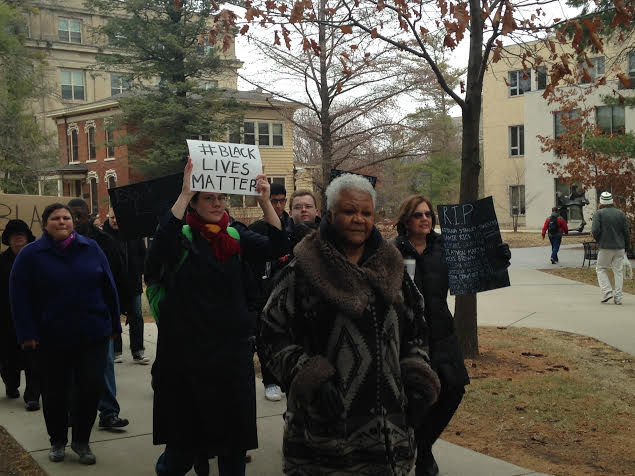NAACP president opens up about her experience with racism
June 22, 2020
Editor’s note: This is part of the the “I Can’t Breathe Project” from “Voices,” a project by the Iowa State Daily that seeks to facilitate civil discourse and build awareness about diversity on Iowa State’s campus.
Edna Clinton was surrounded by racism.
She left her hometown and followed her dreams of becoming a community leader for people of color, now she’s serving as the president of the NAACP chapter in Ames.
In 1993, Clinton and a few others in the Ames community started talking about creating an NAACP chapter in Ames. In 1994, the chapter was created and Clinton was its first president. Years later, George Jackson became the second president and in 2011 Thomas Hill stated the chapter needed more support. He asked Clinton to become the president again.
“It took 400 and some years for all of these to formulate into an actual system to develop that system and to perpetuate that system for the sole purpose of power and control for another group of individuals that deep down in your heart you feared,” Clinton said. “All of the evil that is in the power of the people that control this country, if all of the people of color got together and the shoe was on the other foot you have to think to yourself well I did all of this damage to them and this hurt and this pain to them what are they gonna do to me now that the tide has turned.”
Clinton grew up living in St. Louis, Missouri, in a Black-populated neighborhood with a working class, blue collar family during the civil rights movement era in the 1960s.
Black people in those times were fighting to end segregation. Martin Luther King Jr. was the prominent figure of that time when it came to dealing with racial injustice. In that time period, it was hard for people of color to get access to resources such as jobs, housing and school.
“In the mid ’60s if you were a person of color, you were more likely to get hired if you were lighter skinned,” Clinton said. “There was a thing to hire people of color who were not of much color and that was life, we knew how to navigate, we knew how to pick our jobs, probably went through periods of time of denial of what was happening.”
During this era, Clinton had realized she had to grow up with tough skin. Her family would often teach her their ways of dealing with white supremacy.
“I recall a phrase that used to be common, ‘You knew your place and you stayed in it,’ that didn’t mean we didn’t fight other ways,” Clinton said. “We went through a time period where things appeared on the surface and it would be very good. It would be systematic types of things and you saw a change for about one to 10 years and then gradually things go back to the same old same old.”
When Clinton grew up in St. Louis, she said people made comments about the color of her skin often.
“I can tell you this, people would make comments to me personally and I would hear people say ‘You’ve got to be an islander’ — because I was lighter skinned and had longer hair,” Clinton said. “Why? Because I am of a lighter color and as the old folks would say, I had good hair. And I would pull it up in a ponytail because it was heavy and it would be hot. I was thinking what were they talking about me being an islander, I was born and raised in the U.S. An excuse if you will not expect the fact that I am a person of color, if you were from the islands you were something different.”
Clinton said when she was in school it was very important for her to maintain good grades and pursue a higher education. While she was in school in the early 1960s she was hired at the Union Electric Company in St. Louis as an assistant to an upper-level administrator.
She was always told growing up that in order to take care of yourself you must keep a good job and that was her plan. She was surprised when she found herself in a news article about her being the first Black person to ever work there.
“Naive me, it was a job. I never thought that I was the first that and the other. Low and behold this article was written about me being hired. I was thinking why are they talking about me,” Clinton said. “I grew up in a blue collar family and the whole concept of taking care of yourself was getting a good job, keeping that good job and taking care of yourself, that was the thought process. Don’t depend on nobody else to take care of you. Make sure you have enough skills that’s gonna take care of you in the manner you wanna live. I had this planned out and I never really realized that I was doing something that nobody else had ever done and that was in 1961.”
In the late 1960s, she and her husband moved to Ames after he was offered a job as a teacher.
Clinton said she did not plan on staying in Ames long, only for a couple of years until he got a job offer in a metro area. Since Clinton’s husband was a teacher, he couldn’t relocate.
When her husband and family were able to move, her husband applied in multiple states in the Midwest hoping to find a job.
“He applied in places in Wisconsin, Michigan and Chicago, Minnesota, Ohio,” Clinton said. “He did get a couple of interviews in Wisconsin and I asked, ‘Is the community going to be any different than what we are currently in here in Ames?’ and he said, ‘I don’t think so and I said ‘nope, can’t go there, we gotta be around Black folks.’”
Growing up in St. Louis and suddenly moving to Ames, Clinton said she experienced a culture shock by being the only few Black people in the area.
“When I moved into Ames there were very few people of color there [and] coming from St. Louis racism wasn’t new to me because I’ve lived it my whole life,” Clinton said. “Around the ’70s and the ’80s there were about 15 families and we were a great support system for each other.”
During her time in Ames, she decided to complete her college education.
“I know when I went back to school I was one of these women who thought I was a superhero,” Clinton said. “I had a 40-hour work job and I had 12 credits that I took at Iowa State and I had 2 kids and a husband. The only thing that I could tell you how to get through there by faith is my faith in God. Ask him to lead me and knowing he would not desert me, he made a way for me.”
After Clinton finished up getting her degree she started working at what was once known as the Minority Student Affairs office, now Multicultural Student Affairs at Iowa State University. When Clinton and her family got ready to purchase a home, they experienced redlining and it was suggested they did not live next to or close to another person of color.
“Like I told a group of people, people of color live with racism 24/7, 365 days a year,” Clinton said. “We have always been the subject to injustice. I grew up and became a teenager and I grew up with the idea ‘keep your mouth shut because they will kill you.’”
During that time, the majority of Black residents in Ames worked for Iowa State University, Iowa Department of Transportation or the city. Clinton has seen other types of redlining occur when landlords would not take Section 8, which made it harder for people of color to find decent places to stay.
“Landlords have the right to either accept or deny and some of the realtors in Ames accepted it and there were others that said ‘no way,’” Clinton said. “Then of course this is one of their techniques they make so that you can only live in a certain area and so what they do is they efficiently create a community that is culturally, socioeconomically deprived, you put them all together in the same area.”
Clinton said the North Grand Mall was unsafe for people of color, as teenagers would experience racism by being followed by security when they walked inside.
This led Clinton to demand more justice for her people.
“You would go to the mall, you would think you wouldn’t experience this but people would follow you around when you went into the store,” Clinton said. “By that time I had grown a very substantial backbone and I just turned and said, ‘if I need you I’ll let you know.’ There was a period of time where I worked for the committee here in Ames and the thought process was we have to educate the merchants in Ames is that they have to treat people of color in a different manner and that they are with the so-called mall appearance on Grand Avenue.”
These incidents inspired Clinton to be more involved in the community and make it safer for people of color. Clinton was also involved when the Ames community petitioned to get Jack Trice Stadium named after Jack Trice.
“I think that Jack Trice Stadium being recognized for the only athlete that has ever lost their life for the university I think it’s very appropriate for that stadium to be named for him,” Clinton said. “Because he was a football player here, and he did die on that Iowa State field and he did die as a result of his injuries at Iowa State University playing football.”
The Jack Trice Stadium did not get named until years afterward in 1997 when a group of students of color protested to get the stadium named after him. Clinton was very saddened by this situation.
“To me, that’s a clear sign of racism, why did it take majority students to finally say yes, this is good, before the Board of Regents or the administration did the change? Why? Give me one logical reason why that didn’t happen when the students first petitioned it when it was Black students, Black faculty and Black residents,” Clinton said.
Clinton said she believes racism in Ames is still prevalent and there needs to be a lot of changes made. She said she hears a lot of racism and discrimination among her groups of friends.
“When I hear from my friends that work with immigrants, in this case most of the immigrants that she works with are Sudanese — from Sudan — and when she tells me this story of this woman that she took to 18 different businesses before someone hired her at minimum wage — that to me is racism,” Clinton said. “All she was asking to do is to change a bed, mop a floor, put some towels on a rack. So those kinds of things to me say Ames still has a long way to go.”
Clinton found herself working at the Creative Center for Justice where she became more heavily involved in shaping the community.
In the late 1990s Clinton owned a black ‘98 tinted window car, which was very popular during those times — “the bomb.” When she drove her car she said she never got stopped by the police but when her sons drove in her car they did.
“It was a case of racial profiling because my car looked like if you were a long Black man were suppose to be into dealing and selling drugs, my sons weren’t that way,” Clinton said. “The third time that it happened I said this is enough, I said I can’t sleep at night when you guys have my car, I can’t sleep at night until you come back in.”
She said her experiences inspired her to walk into the police station to demand justice for her sons.
“So I told him the story and told him that it will stop or I will own you because I will find a way to take you to court and whatever officer stops my son,” Clinton said. “This is a clear case of racial profiling, they never gotten a ticket, there was no broken taillight, they didn’t make any illegal turns and they were not speeding, so why were they stopped.”
Even though Clinton’s sons are much older and live on their own, she still worries about their safety.
“My house was a safe house for all of the Black children during the time period when my children were going to school,” Clinton said. “You got issues and you can’t get home, you come to Ms. Edna’s house. You got an issue with a teacher and you don’t feel like you can talk to your parents, come to Ms. Edna’s house. As long as you were respectful, I will let you air out your grievances [and] then we would figure out the next step.”
To lessen all of the stress from the harsh realities of being a person of color, Clinton would often take “infusion trips” where she would go hang around a bigger Black community to calm her anxiety.
Clinton, the NAACP members and the city of Ames have all partnered together to create the series “Taking the Lead 2020: Policing & Justice” on YouTube. Clinton came up with this idea to show the community of Ames the police department is not capable of unjust and brutal behavior.
“This is the reason why I am so actively involved in making a change,” Clinton said. “Because I truly believe that if we don’t work together we’re all in this boat together and in order to survive we do have to work together or we’re gonna perish and we’re gonna perish together because there’s no exposing the racism.”

















